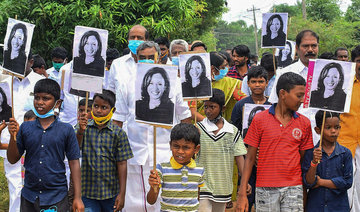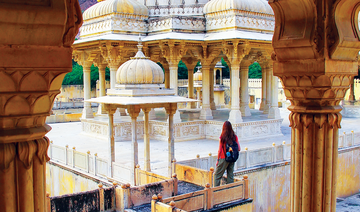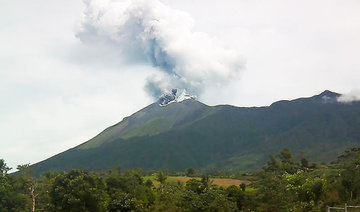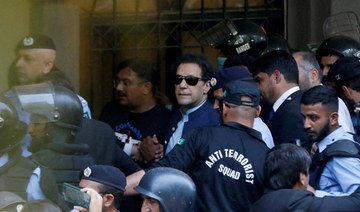NEW DELHI: Crowds packed New Delhi markets on Thursday ahead of India’s biggest holiday of the year, shrugging off record coronavirus cases and toxic smog in the capital.
Shoppers looking for food and last-minute gifts before the Diwali festival of lights said they were fed up with being cooped up, no matter the deadly threats around them.
New Delhi recorded 8,600 new Covid-19 cases on Wednesday, the highest number since the pandemic started and 85 deaths, and experts said the teeming markets could easily become “super-spreaders.”
India has reported nearly 8.7 million infections, the world’s second-highest caseload behind the United States, and there are fears that a Diwali surge could hit major cities across the country of 1.3 billion.
Nearly a week of “hazardous” level air pollution has only added to health fears.
Loudspeaker warnings to wear masks and maintain social distancing serenaded bargain hunters who packed the narrow lanes of Lajpat Nagar market, one of the busiest in the city of 20 million people.
Some winced in pain from swabs put up their nose as they took a Covid-19 test at an open-air center set up in one street.
But university student Harsimran Singh said it was almost like a normal chaotic Diwali.
“I am not surprised to see the market full,” he said. “We are Indians, we are not afraid of anything.”
“People just don’t care,” said Tanisha, a 19-year-old student. “People want to come out.”
“I am so bored at home that I am not scared to shop,” she added.
While the 128,000 recorded pandemic fatalities in India is among the world’s lowest death rates, experts worry that the number of cases — currently about 47,000 a day — will skyrocket in coming weeks.
Some say India could see 200,000 new cases a day during its short winter.
“Even in summer, super-spreader events with crowds of people will always pose a big risk of transmission,” said K. Srinath Reddy, head of the Public Health Foundation of India.
“But this gets greatly enhanced because of the cold weather as well as the pollution.”
“For a variety of reasons, (in winter) the immunity goes down, the viral susceptibility goes up, the virus survival on outside surfaces increases and we now are in great danger of all of these factors joining together,” he added.
Reddy said that Diwali posed a “great danger” because of the crowds, the cold and the air pollution, which studies have linked to increased coronavirus deaths.
But the government is also desperate to reboot an economy now in recession.
Calls have been made for emergency measures to counter the pollution levels but they have yet to be introduced.
Traditional Diwali firecrackers have already been banned in the capital and other cities with hazardous air pollution, and traders say they cannot afford more losses.
“People are there but they are not spending as much,” said clothes shop owner Harsh Kumar.
Even before Prime Minister Narendra Modi announced one of the world’s most stringent lockdowns in March, the economy was struggling with sluggish growth and record unemployment.
The government announced new measures to boost employment on Thursday, adding to $266 billion in public spending already promised to get the economy turning again.
Shoppers shrug off pandemic, pollution ahead of India’s biggest festival
https://arab.news/rf838
Shoppers shrug off pandemic, pollution ahead of India’s biggest festival
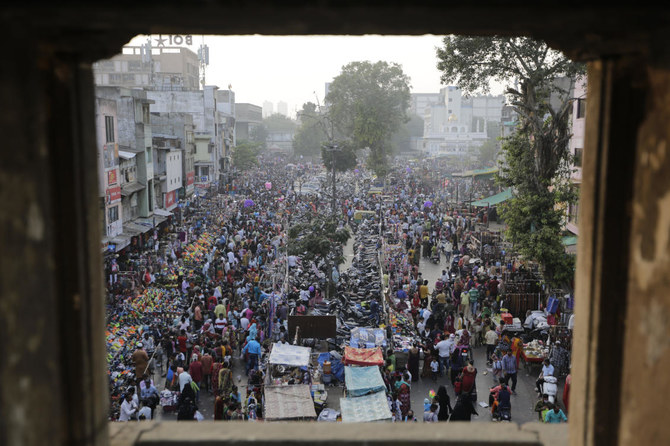
- Shoppers looking for food and gifts before Diwali said they were fed up with being cooped up
- There are fears that a Diwali surge could hit major cities across the country of 1.3 billion
Alert level raised for Philippine volcano after ‘explosive eruption’: volcanology agency

- Mount Kanlaon on the central island of Negros erupted shortly before 7:00 p.m.
- Kanlaon is one of 24 active volcanoes in the archipelago nation
MANILA: The alert level for a Philippine volcano was raised Monday after an “explosive eruption” sent a plume of ash, gas and steam five kilometers (three miles) into the sky, the volcanology agency said.
Mount Kanlaon on the central island of Negros erupted shortly before 7:00 p.m. (1100 GMT), prompting warnings for nearby residents to wear facemasks due the threat of volcanic gases and falling ash.
“When it erupted we heard a thunder-like sound,” Ethan Asentista-Khoo, 35, said from his home in Pula village near the volcano.
“There was like a fire on the mouth of the volcano, which lasted around one to two minutes. I didn’t see any lava or rocks coming out.”
The Philippines is located in the seismically active Pacific “Ring of Fire” that hosts more than half of the world’s volcanoes.
Kanlaon is one of 24 active volcanoes in the archipelago nation.
Eruptions can be deadly, with pyroclastic and lahar flows as well as ashfall posing hazards to communities surrounding the volcano.
Ex-Pakistan PM Imran Khan acquitted in state secrets case, but to stay in jail

- Former leader was sentenced to 10 years in prison by a lower court on charges of making public a classified cable sent to Islamabad by Pakistan’s ambassador in Washington in 2022
ISLAMABAD: A high court in Pakistan acquitted jailed former Prime Minister Imran Khan on Monday from a conviction on charges of leaking state secrets, his lawyer and his party said, but Khan will remain in prison for now due to a conviction in another case.
Khan, 71, was sentenced to 10 years in prison by a lower court on charges of making public a classified cable sent to Islamabad by Pakistan’s ambassador in Washington in 2022.
Shah Mehmood Qureshi, who was Khan’s foreign minister during his tenure from 2018-2022, was also acquitted of the charges.
“Thank God, the sentence is overturned,” a spokesman for legal affairs from Khan’s Pakistan Tehreek-e-Insaf party, Naeem Panjutha, said in a post on the X social media platform.
Despite the acquittal, Khan will remain in prison, having also been convicted in another case relating to his marriage to his third wife, Bushra Khan, contravening Islamic traditions.
UK says Rwanda asylum seekers’ deportation flights to begin on July 23

- Policy of sending asylum seekers who arrived in Britain to the East African nation is one of Rishi Sunak’s flagship policies
(Adds details in 2, 3rd paragraphs)
LONDON: The British government says it intends to begin deporting asylum seekers on July 23, court documents showed on Monday, although the controversial scheme is dependent on Prime Minister Rishi Sunak’s Conservative parties winning the upcoming election.
The policy of sending asylum seekers who arrived in Britain to the East African nation is one of Sunak’s flagship policies but legal and parliamentary obstacles have meant it has never got off the ground.
Sunak recently said the deportation flights would not leave before an election on July 4 but he has promised if he wins they would begin soon after, although he is trailing the opposition Labour Party by about 20 points in opinion polls and it has promised to scrap the plan.
In documents submitted to the London High Court as part of a charity’s challenged to the policy, government lawyers said the intention was “to effect removals with a flight to Rwanda on 23 July 2024 (and not before).”
Facing ‘systematic’ pressure to recognize Israel, Indonesia stands firm on Palestine support: FM

- Indonesia was among the first countries to recognize Palestinian statehood in 1988
- In April, Israeli media reports claimed Jakarta began OECD-brokered talks with Tel Aviv
JAKARTA: Indonesia will continue to support Palestine in the face of systematic pressure from Israel and its allies to normalize ties with Tel Aviv, Foreign Affairs Minister Retno Marsudi said on Monday.
Jakarta has no diplomatic relations with Tel Aviv and has been one of the most vocal supporters of Palestine since the beginning of Israel’s onslaught on Gaza in October. The Indonesian government has repeatedly called for an end to the occupation of Palestinian territories and for a two-state solution based on pre-1967 borders.
Speaking to university students at the Gadjah Mada University in Yogyakarta on Monday, Marsudi highlighted the “worsening situation” in the besieged enclave — where over 36,400 Palestinians have been killed — and said that Israel has been making “strategic and systematic efforts to finish off” Palestine.
“There are systematic efforts by Israel and its allies to … lobby and pressure Muslim countries to start considering opening up and normalizing ties with Israel,” she said.
In April, viral Israeli media reports claimed that Jakarta had plans to establish diplomatic ties with Tel Aviv as part of a deal to smooth Indonesia’s entry into the Organization for Economic Cooperation and Development.
But the Indonesian Ministry of Foreign Affairs swiftly rejected those claims then, saying that the world’s most populous Muslim-majority country would remain consistent in defending Palestine.
One of the staunchest supporters of Palestine, Indonesia was among the 78 countries to first recognize Palestine in 1988. It sees Palestinian statehood as mandated by the nation’s constitution, which calls for the abolition of colonialism.
Indonesia will continue its support for Palestine on the international stage, Marsudi said, including by pushing for an immediate and lasting ceasefire and urging Tel Aviv to comply with an order by the International Court of Justice to stop its military offensive in the southern Gaza city of Rafah.
Israel’s ground and air attacks have in the last eight months destroyed most of Gaza’s civilian and medical infrastructure, injuring over 82,000 people while thousands remain missing under the rubble.
The Israeli military has also blocked water, food and aid supplies to the territory, bringing its more than 2 million inhabitants to the brink of famine.
“Indonesia has consistently upheld universal principles and values to continue supporting the nation of Palestine. Consistency in embracing these principles is not easy. It’s truly not easy to keep this principle amid today’s messy world filled with pressure and promises of transactions here and there,” Marsudi said.
“But thank God that until this very moment, the Indonesian government has been able to remain steadfast and consistent in defending the nation of Palestine … We have a duty to defend justice and humanity because it is in line with the mandate of our 1945 constitution.”
Indian Islamic center warns Muslims against felling trees

- Much of northern India has been gripped by a deadly heatwave with temperatures above 45° Celsius
LUCKNOW: One of India’s most influential Islamic centers has warned Muslims not to chop down trees or burn fields after harvesting to help stem climate change and surging temperatures.
Much of northern India has been gripped by a deadly heatwave with temperatures above 45° Celsius (113 degrees Fahrenheit), killing scores of people by heatstroke.
“Every Muslim must ensure no green trees and crops are set on fire,” Khalid Rasheed Farangi Mahal, chair of the Islamic Centre of India, said.
Mahal, a top scholar in the northern city of Lucknow, issued the non-binding fatwa or ruling on Sunday, saying that the religious duty of Muslims to conserve greenery and water was “stated in the Qur’an”.
“Burning trees and crops is forbidden in Islam and is considered a grave sin,” read the fatwa, published in Urdu and Hindi.
He also urged Islamic clerics to encourage stewardship of the environment during their sermons – telling people to take care of the trees around them.
“Instead of merely planting a sapling symbolically, it is more meaningful to take care of existing plants and trees,” he said, urging Muslims to prevent pollution of waterways and the sea.
Last week, an Indian court urged the government to declare a national emergency over the country’s ongoing heatwave, saying that hundreds of people had died during weeks of extreme weather.
The High Court in the western state of Rajasthan, which has suffered some of the hottest weather, said authorities had failed to take appropriate steps to protect the public from the heat.
India is no stranger to searing summer temperatures but years of scientific research have found climate change is causing heatwaves to become longer, more frequent and more intense.
Researchers say human-induced climate change has driven the devastating heat impact in India and should be taken as a warning.






